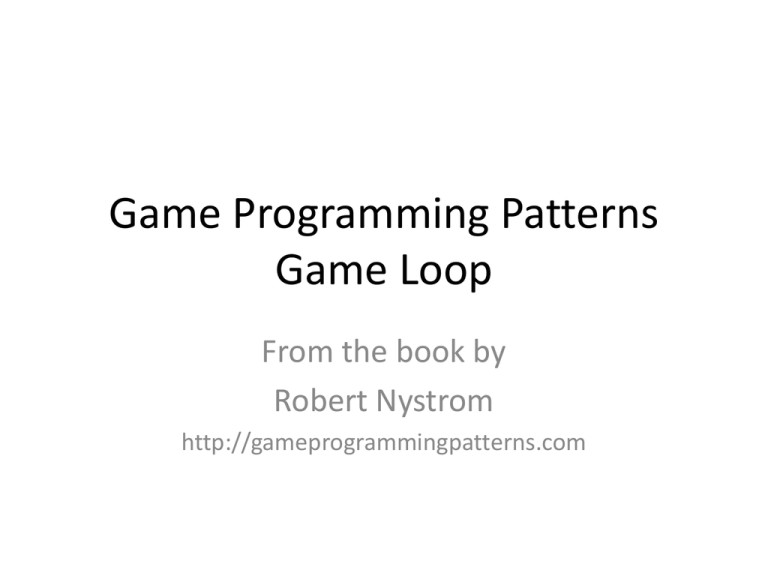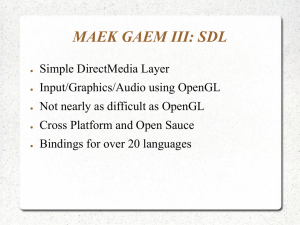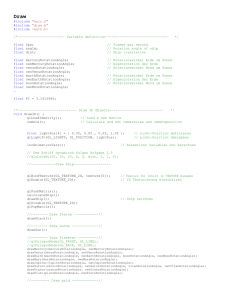Game Loop Pattern
advertisement

Game Programming Patterns
Game Loop
From the book by
Robert Nystrom
http://gameprogrammingpatterns.com
A simple main loop for an interactive program:
while (true)
{
char* command = readCommand(); // read text from keyboard
handleCommand(command);
}
A modern event-driven program such as your word processor is similar:
while (true)
{
Event* event = waitForEvent();
dispatchEvent(event);
}
Events could be key presses, mouse clicks, system shutdown, window
minimization, timer firing, or many other notifications.
A game keeps moving even when the user isn’t providing input. This is the
first, key part of a real game loop: it processes user input, but doesn’t wait
for it.
while (true)
{
processInput(); // doesn’t wait
update();
// advances game simulation one step
render();
// draws a frame on the screen
}
We want this to run at a fixed number of frames per second, no matter how
many objects exist, no matter how complex the physics, and no matter
what fast the CPU is.
We don’t want the game to run too fast or too slow.
A simple fix: wait. If we want 60 FPS, then we have 16 milliseconds per
frame.
while (true)
{
double start = getCurrentTime();
processInput();
update();
render();
sleep(start + MS_PER_FRAME - getCurrentTime());
}
A simple fix: wait. If we want 60 FPS, then we have 16 milliseconds per
frame.
while (true)
{
double start = getCurrentTime();
processInput();
update();
render();
sleep(start + MS_PER_FRAME - getCurrentTime());
}
Sleep() makes sure the game doesn’t run too fast. But it doesn’t
help if the game runs too slowly.
Let’s try something a bit more sophisticated. The problem we have
basically boils down to:
1. Each update advances game time by a certain amount.
2. It takes a certain amount of real time to process that.
If step two takes longer than step one, the game slows down.
But if we can advance the game by more than 16ms of game time in a
single step, then we can update the game less frequently and still keep up.
Choose a time step to advance based on how much real time passed
since the last frame.
double lastTime = getCurrentTime();
while (true)
{
double current = getCurrentTime();
double elapsed = current - lastTime;
processInput();
update(elapsed);
// here is the magic
render();
lastTime = current;
}
Say you’ve got a bullet shooting across the screen. With a fixed time step,
in each frame, you’ll move it according to its velocity. With a variable time
step, you scale that velocity by the elapsed time.
Looks good:
• The game plays at a consistent rate on different hardware.
• Players with faster machines are rewarded with smoother gameplay.
But, alas, there’s a serious problem lurking ahead: we’ve made the game
non-deterministic and unstable.
Consider a two-player networked game, where one computer runs at 100
FPS and one runs at 50 FPS. A bullet travels across each screen for one
second, at 100 meters (in game space) per second.
Computer one: 100 meters/second * (100 * .01 seconds) = 100.00000007
Computer two: 100 meters/second * (50 * .02 seconds) = 100.00000004
Floating point rounding error!
Also, many physics engines don’t handle changing time steps.
Better idea: fixed time steps and flexibility as to when we render:
double previous = getCurrentTime();
double lag = 0.0;
while (true)
{
double current = getCurrentTime();
double elapsed = current - previous;
previous = current;
lag += elapsed;
processInput();
while (lag >= MS_PER_UPDATE) // not MS_PER_FRAME
{
update();
// our old friend fixed update
lag -= MS_PER_UPDATE;
}
render();
}
One issue is left, “residual lag”. Update happens at a fixed interval, but
rendering is less frequent than updating, and not as steady. Potentially,
motion looks jagged or stuttery.
Conveniently, we actually know exactly how far between update
frames we are when we render: it’s stored in lag. We bail out of the
update loop when it’s less than the update time step, not when it’s
zero. That leftover amount? That’s how far into the next frame we
are. When we go to render, we’ll pass that in:
render(lag / MS_PER_UPDATE);
Some additional thoughts.
Who owns the game loop – the engine/platform or the game
programmer?
Is power consumption important? In particular, with mobile devices
you might sacrifice some frame rate and “sleep” between frames.
There are some trade-offs between more complex coding and
greater adaptability to a range of CPU speeds.
Unity’s
Mono
Engine:
What about SDL?
In Windows, the entry point is WinMain(), not main().
But didn’t you write a main() in your SDL programs??!!
#include <iostream>
#include <SDL.h>
int main(int argc, char **argv)
{
if (SDL_Init(SDL_INIT_EVERYTHING) != 0)
{
std::cout << "SDL_Init Error: " << SDL_GetError() << std::endl;
return 1;
}
SDL_Quit();
return 0;
}
From C:\...\SDL\src\main\windows\SDL_windows_main.c
/* This is where execution begins [windowed apps] */
int WINAPI
WinMain(HINSTANCE hInst, HINSTANCE hPrev, LPSTR szCmdLine, int sw)
{
char **argv;
int argc;
char *cmdline;
/* Grab the command line */
TCHAR *text = GetCommandLine();
cmdline = SDL_strdup(text);
if (cmdline == NULL) {
return OutOfMemory();
}
/* Parse it into argv and argc */
argc = ParseCommandLine(cmdline, NULL);
ParseCommandLine(cmdline, argv);
/* Run the main program */
console_main(argc, argv);
SDL_stack_free(argv);
SDL_free(cmdline);
return 0;
}
Also from C:\...\SDL\src\main\windows\SDL_windows_main.c
/* This is where execution begins [console apps] */
int
console_main(int argc, char *argv[])
{
int status;
SDL_SetMainReady();
/* Run the application main() code */
status = SDL_main(argc, argv);
/* Exit cleanly, calling atexit() functions */
exit(status);
/* Hush little compiler, don't you cry... */
return 0;
}
And in SDL_main.h (which is included by SDL.h)
#define main SDL_main
extern C_LINKAGE int SDL_main(int argc, char *argv[]);











